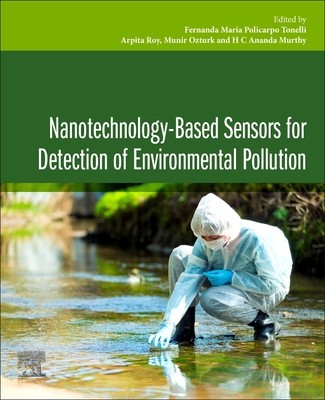
- We will send in 10–14 business days.
- Publisher: Elsevier
- ISBN-10: 0443141185
- ISBN-13: 9780443141188
- Format: 19.1 x 23.5 x 3.3 cm, minkšti viršeliai
- Language: English
- SAVE -10% with code: EXTRA
Nanotechnology-Based Sensors for Detection of Environmental Pollution (e-book) (used book) | bookbook.eu
Reviews
Description
Nanotechnology-based Sensors for Detection of Environmental Pollution discusses the use of nanotechnology to generate sensors capable of performing efficient detection of different types of environmental pollutants. Nanomaterial's characteristics such as large surface area, good reactivity, and possibility to suffer chemical surface modification to recognize different types of molecules are useful, especially to perform the detection of specific environmental pollutants. Innovative and efficient ways to detect environmental pollution are urgently needed for sustainability and the nanotechnology field has an enormous potential to offer strategic solutions. Nanotechnology-based sensors offer an efficient way of detecting the presence of contaminants and determine its structure and chemical nature is by applying nanotechnology and/or nanobiotechnology. This book will contain 5 parts: the first one will be dedicated to exploring environmental pollution as a threat to life on Earth and main contaminants (inorganic, organic or pathogens) and the risk they represent to living beings. The second part will be dedicated to nanotechnology allowing pollutants' detection covering a brief history of nanotechnology-based sensors, different types of nanotechnology-based sensor (optical, electrochemical, and magnetic), nanotechnology-based sensors' design and fabrication and nano biosensors. The third part will be focused on important specific pollutants (pesticides, heavy metal, dyes, toxic gas, pharmaceutical waste, petroleum hydrocarbons, and pathogenic microbes) and their detection by nanotechnology-based sensors. The fourth part will be dedicated to important nanomaterials in nanotechnology-based sensors, exploring carbon-based and non-carbon-based material in nanoscale (graphene, carbon nanotubes, quantum dots, magnetic nanomaterials, non-magnetic nanoparticles) and also point-of-care sensors and functionalization to generate optimized nanotechnology-based sensors to pollutants' detection. The fifth and last part of Nanotechnology-based Sensors for Efficient Detection of Environmental Pollution will address relevant practical aspects related to nanotechnology-based sensors, covering advantages and challenges, safety, economic and commercial aspects related to the field and also sustainability, highlighting green nanomaterials on nanotechnology-based sensors.
EXTRA 10 % discount with code: EXTRA
The promotion ends in 21d.06:29:11
The discount code is valid when purchasing from 10 €. Discounts do not stack.
- Publisher: Elsevier
- ISBN-10: 0443141185
- ISBN-13: 9780443141188
- Format: 19.1 x 23.5 x 3.3 cm, minkšti viršeliai
- Language: English English
Nanotechnology-based Sensors for Detection of Environmental Pollution discusses the use of nanotechnology to generate sensors capable of performing efficient detection of different types of environmental pollutants. Nanomaterial's characteristics such as large surface area, good reactivity, and possibility to suffer chemical surface modification to recognize different types of molecules are useful, especially to perform the detection of specific environmental pollutants. Innovative and efficient ways to detect environmental pollution are urgently needed for sustainability and the nanotechnology field has an enormous potential to offer strategic solutions. Nanotechnology-based sensors offer an efficient way of detecting the presence of contaminants and determine its structure and chemical nature is by applying nanotechnology and/or nanobiotechnology. This book will contain 5 parts: the first one will be dedicated to exploring environmental pollution as a threat to life on Earth and main contaminants (inorganic, organic or pathogens) and the risk they represent to living beings. The second part will be dedicated to nanotechnology allowing pollutants' detection covering a brief history of nanotechnology-based sensors, different types of nanotechnology-based sensor (optical, electrochemical, and magnetic), nanotechnology-based sensors' design and fabrication and nano biosensors. The third part will be focused on important specific pollutants (pesticides, heavy metal, dyes, toxic gas, pharmaceutical waste, petroleum hydrocarbons, and pathogenic microbes) and their detection by nanotechnology-based sensors. The fourth part will be dedicated to important nanomaterials in nanotechnology-based sensors, exploring carbon-based and non-carbon-based material in nanoscale (graphene, carbon nanotubes, quantum dots, magnetic nanomaterials, non-magnetic nanoparticles) and also point-of-care sensors and functionalization to generate optimized nanotechnology-based sensors to pollutants' detection. The fifth and last part of Nanotechnology-based Sensors for Efficient Detection of Environmental Pollution will address relevant practical aspects related to nanotechnology-based sensors, covering advantages and challenges, safety, economic and commercial aspects related to the field and also sustainability, highlighting green nanomaterials on nanotechnology-based sensors.


Reviews